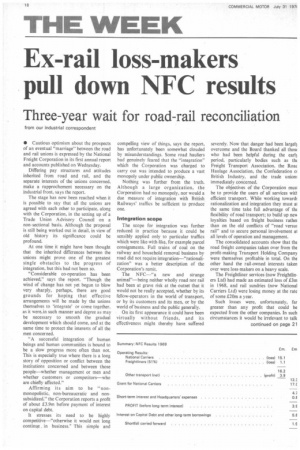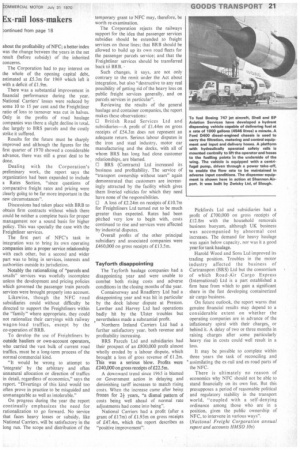Ex-rail loss-makers pull down NFC results
Page 20

Page 23

If you've noticed an error in this article please click here to report it so we can fix it.
Three-year wait for road-rail reconciliation
from our industrial correspondent • Cautious optimism about the prospects of an eventual "marriage" between the road and rail unions is expressed by the National Freight Corporation in its first annual report and accounts published on Wednesday.
Differing pay structures and attitudes inherited from road and rail, and the separate interests of the unions concerned, make a rapprochement necessary on the industrial front. says the report.
The stage has now -been reached when it is possible to say that all the unions are agreed with each other to participate. along with the Corporation, in the setting up of a Trade Union Advisory Council on a non-sectional basis. Although the proposal is still being worked out in detail, in view of old history its significance could be profound.
At one time it might have been thought that the inherited differences between the unions might prove one of the greatest single obstacles to the progress of integration, but this had not been so.
"Considerable co-operation has been achieved," says the report. "Though the wind of change has not yet begun to blow very sharply, perhaps, there are good grounds for hoping that effective arrangements will be made by the unions themselves to 'integrate' or come together, as it were, in such manner and degree as may be necessary to smooth the gradual development which should come, and at the same time to protect the interests of all the men concerned.
"A successful integration of human beings and human communities is bound to be a slow progress more often than not. This is especially true where there is a long story of opposition or conflict between the institutions concerned and between those people—whether management or men and whether customers or competitors—who are chiefly affected."
Affirming its aim to be "nonmonopolistic, non-bureaucratic and nonsubsidized," the Corporation reports a profit of about £3.9m before payment of interest on capital debt.
It stresses its need to be highly competitive—"otherwise it would not long continue _ in business." This simple and compelling view of things, says the report, has unfortunately been somewhat clouded by misunderstandings. Some road hauliers had genuinely feared that the "integration" which the Corporation was charged to carry out was intended to produce a vast monopoly under public ownership.
Nothing was further from the truth. Although a large organization, the Corporation had no monopoly, nor would a due measure of integration with British Railways' traffics be sufficient to produce one.
Integration scope The scope for integration was further reduced in practice because it could be sensibly applied only to particular traffics which were like-with-like, for example parcel consignments. Full trains of coal on the railway and household removal business by road did not require integration—"rationalization" was a better description of the Corporation's remit.
The NFC—"a new and strange animal"—being neither wholly road nor rail had been at grave risk at the outset that it would not be really accepted, whether by its fellow-operators in the world of transport, or by its customers and its men, or by the world of business and the public generally.
On its first appearance it could have been virtually without friends, and its effectiveness might thereby have suffered severely. Now that danger had been large!) overcome and the Board thanked all thost who had been helpful during the earl) period, particularly bodies such as tht Freight Transport Association, the Roac Haulage Association, the Confederation ol British Industry, and the trade union' immediately concerned.
The objectives of the Corporation musi be to provide the users of all services with efficient transport. While working towardE rationalization and integration they must al the same time take full advantage of thc flexibility of road transport; to build up nevt loyalties based on freight business rather than on the old conflicts of "road versuE rail" and to secure personal involvement al all levels of operation and management.
The consolidated accounts show that the road freight companies taken over from the profit-making Transport Holding Company were themselves profitable in total. On the other hand the rail-owned interests taken over were loss-makers on a heavy scale.
The Freightliner services (now Freightliners Ltd) had made an estimated loss of £3m in 1968, and rail sundries (now National Carriers Ltd) were losing money at the rate of some £20m a year.
Such losses were, unfortunately, far greater than any profit that could be expected from the other companies. In such circumstances it would be irrelevant to talk
about the profitability of NFC; a better index was the change between the years in the net result (before subsidy) of the inherited concerns.
The Corporation had to pay interest on the whole of the opening capital debt, estimated at £5.3m for 1969 which left it with a deficit of £1.9m.
There was a substantial improvement in financial performance during the year. National Carriers' losses were reduced by some 10 to 15 per cent and the Freightliner ratio of loss to turnover was cut in halves. Only in the profits of road haulage companies was there a slight decline in total, due largely to BRS parcels and the costly strike it suffered.
Results for the future must be sharply improved and although the figures for the first quarter of 1970 showed a considerable advance, there was still a great deal to be done.
Dealing with the Corporation's preliminary work, the report says the arganization had been expanded to include a Rates Section, "since questions of comparative freight rates and pricing were clearly going to be far more important in the new circumstances".
Discussions had taken place with BRB to obtain firm contracts without which there could be neither a complete basis for proper management nor a sound basis for higher policy. This was specially the case with the Freightliner services.
The first part of NFC's task in integration was to bring its own operating companies into a proper service relationship with each other, but a second and wider part was to bring in services, interests and authorities outside its jurisdiction.
Notably the rationalizing of "parcels and smalls" services was woefully incomplete unless the development and pricing policies which governed the passenger train parcels services were brought properly into account.
Likewise, though the NFC road subsidiaries could without difficulty be directed to support the Freightliners within the "family" where appropriate, they could not rationalize their carryings with railway wagon-load traffics, except by the co-operation of BRB.
To develop the use of Freightliners by outside hauliers or own-account operators, who carried the vast bulk of current road traffics, must be a long-term process of the normal commercial kind.
"It would be wrong to attempt to 'integrate' by the arbitrary and often unnatural allocation or direction of traffics in detail, regardless of economics," says the report. "Divertings of this kind would too often prove in practice to be misguided and unmanageable as well as intolerable."
On progress during the year the report continually emphasizes the need for rationalization to go forward. No service that faces heavy losses or subsidy, like National Carriers, will be satisfactory in the long run. The scope and distribution of the temporary grant to NFC may, therefore, be worth re-examination.
The Corporation rejects the railways support for the idea that passenger services subsidies should be extended to freight services on those lines; that BRB should be allowed to build up its own road fleets for the passenger parcels service; and that the Freightliner services should be transferred back to BRB.
Such changes, it says, are not only contrary to the remit Under the Act about integration, but also "destructive to any real possibility of getting rid of the heavy loss on public freight services generally, and on parcels services in particular".
Reviewing the results of the general haulage and container companies, the report makes these observations: O British Road Services Ltd and subsidiaries—A profit of £1.44m on gross receipts of £54.3m does not represent an adequate return. Serious labour disputes in the iron and steel industry, motor car manufacturing and the docks, with all of whom BRS has long had close customer relationships, are blamed. O BRS (Contracts) Ltd increased its business and profitability. The service of "transport ownership without tears" again demonstrated that customers are increasingly attracted by the facility which gives them liveried vehicles for which they need have none of the responsibilities.
o A loss of £2.24m on receipts of £10.7m
for Freightliners Ltd turned out to be much greater than expected. Rates had been pitched very low to begin with, costs continued to rise and services were affected by industrial disputes.
Overall profits of the other principal subsidiary and associated companies were 1460,000 on gross receipts of £ I 3.5m.
Tayforth disappointing
The Tayforth haulage companies had a disappointing year and were unable to combat both rising costs and adverse conditions in the closing months of the year.
Containerway and Roadferry Ltd had a disappointing year and was hit in particular by the dock labour dispute at Preston. Lawther and Harvey Ltd had operations badly hit by the Ulster troubles but nevertheless made a substantial profit.
Northern Ireland Carriers Ltd had a further satisfactory year. both revenue and profitability increasing.
BRS Parcels Ltd and subsidiaries had their prospect of an £800,000 profit almost wholly eroded by a labour dispute, which brought a loss of gross revenue of 11.2m. This was a serious blow. Profits were £240,000 on gross receipts of £22.5m.
A downward trend since 1965 is blamed on Government action in delaying and diminishing tariff increases to match rising costs. When the increase came after being frozen for 2+ years, "a dismal pattern of costs being well ahead of normal rate adjustments had come into being".
National Carriers had a profit (after a grant of £17m) of £1.93m on gross receipts of £47.4m, which the report describes as "positive improvement". Pickfords Ltd and subsidiaries had a profit of £700,000 on gross receipts of £12.8m with the household removals business buoyant, although UK business. was accompanied by abnormal cost increases. The demand for heavy haulage was again below capacity, nor was it a good year for tank haulage.
Harold Wood and Sons Ltd improved its trading position. Troubles in the motor industry affected the business of Cartransport (BRS) Ltd but the consortium of which Road-Air Cargo Express (International) Ltd is a part established a firm base from which to gain a significant share in the fast developing containerized air cargo business.
On future outlook, the report warns that genuine financial results may depend to a considerable extent on whether the operating companies are in advance of the inflationary spiral with their charges,. or behind it. A delay of two or three months in raising charges after some particularly heavy rise in costs could well result in a loss.
It may be possible to complete within three 'years the task of reconciling and assimilating the ex-rail and ex-road parts of the NFC.
There is ultimately no reason of economics why NFC should not be able to stand financially on its own feet. But this presupposes a period of reasonable political and regulatory stability in the transport world, "coupled with a self-denying ordinance among those who are in a position, given the public ownership of NFC, to intervene in various ways".
(National Freight Corporation annual report and accounts HMSO 10s)
































































































